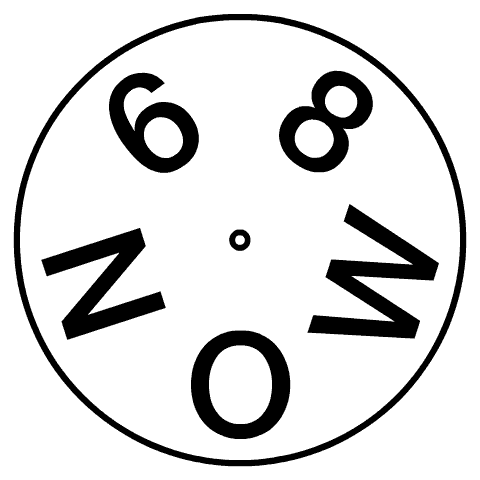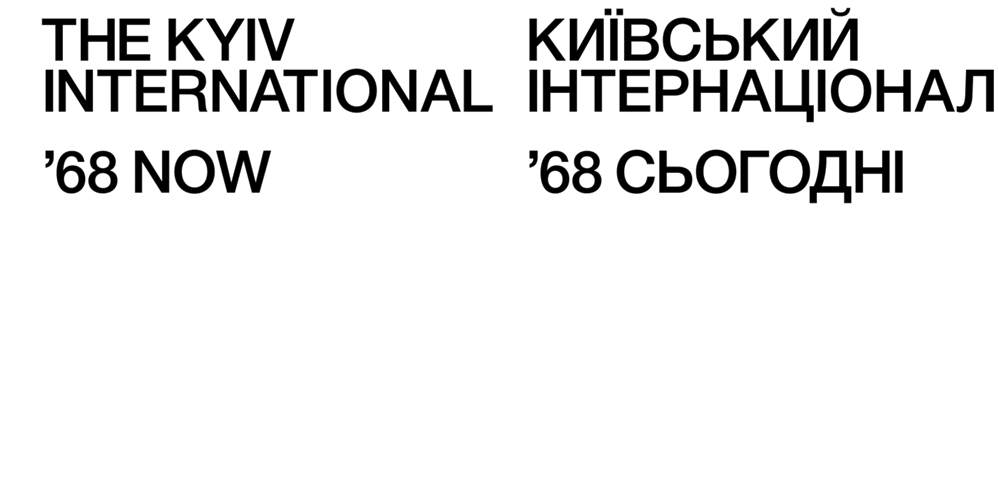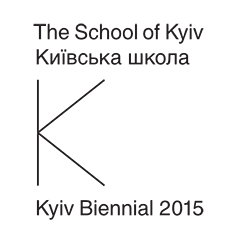THE KYIV INTERNATIONAL – ’68 NOW
Kyiv, 11–25 May 2018
The House of Cinema
6 Saksahanskoho St.
The Kyiv International project aims to reveal the emancipatory potential in the idea of the political International, which first emerged in Europe. Today, in the age of structural crises of global institutions – when the maintenance of a transnational status quo is constructed from violated borders, peripheral wars, and the emergence of new walls and conflicts – the idea of cross-border unity and international solidarity is of utmost urgency for the future survival of Europe. The Kyiv International – ’68 NOW, the second edition of The Kyiv International – Kyiv Biennial 2017, will take place in the format of an international forum for art and knowledge, integrating art projects as an agora for debate.
The Kyiv International edition of May 2018 will explore the political and cultural heritage of the revolt and struggle of 1968, considering the antinomies of this moment for the West and East of Europe fifty years onward. The legacy of May 1968 remains a symbol of liberation and rebellion against entrenched power structures, and a cultural and artistic benchmark for Western Europe. The commemoration of the 50th anniversary of the Prague Spring and Soviet military invasion of Czechoslovakia – most immediate in Eastern Europe – continue to define political and cultural divides across the continent. By overlapping the contrasting dimensions of this event, which is the starting point of contemporaneity, The Kyiv International – ’68 NOW contributes to the development of a united European subjectivity grounded in democratic internationalism, based on the principles of solidarity and inclusivity.
PROGRAM
May 11, Friday, 19:00 – Red hall
“Repoliticizing the French 68”
Lecture by Jacques Rancière (France)
In the dominant sociological interpretation, the French May 68 is viewed as a great surge in “baby-boomers,” nurtured by economic prosperity and eager to cast off the yoke of patriarchal authority in order to fully enjoy the pleasures of consumer society and sexual freedom. This interpretation, however, remains quite distinct from the motivations and practices of a movement that focused on the relationship between the University system and capitalist domination. Far from a youth carnival, the May 68 sequence can allow us to perceive what politics means as the power of collective invention: the invention of names that break social identities; the invention of actions that burst apart the mediations which define the consensual order; the transformation of the material and symbolic use of space; and the autonomous unfolding of an accelerated time. Such inventions are usually thought of as the manifestation of spontaneous and ephemeral revolt. Yet it can easily be ascertained that it is those momentary disruptions of the normal state of things that bring into existence a specific temporality of politics.
The lecture will be held in English with simultaneous translation into Ukrainian.
May 12, Saturday, 16:00 – Blue hall
“Superstructure”
Presentation by Experimental Jetset: Marieke Stolk, Erwin Brinkers and Danny van den Dungen (The Netherlands)
Amsterdam-based graphic design studio Experimental Jetset will give a presentation on their ongoing research on the notion of the city as a platform for (graphic) language. Referring to their recent retrospective exhibition at RMIT in Melbourne as a point of departure, the presentation will take the form of an intuitive slideshow, focusing on four main themes in their research – Constructivism, the Situationist International, Provo, and Post-Punk – while incorporating examples from their own work.
The event will be held in English.
May 13, Sunday, 16:00 – Blue hall
“366 Liberation Rituals”
Artist talk by Igor Grubić (Croatia)
In this talk, Igor Grubić will present the project “366 Liberation Rituals,” which consists of different micro-political interventions into the public space that he was doing on an everyday basis throughout 2008, and for part of 2009. The starting point for the project was the 40th anniversary of 1968: Igor Grubić refers to the heritage of conceptual art practices of the former territories of Yugoslavia, Jean-Luc Godard political films and the cultural strategies of the late 60s and early 70s.
The event will be held in English.
May 18, Friday, 19:00 – Blue hall
“The Affects of Democracy”
Lecture by Chantal Mouffe (Belgium)
In this lecture, Chantal Mouffe will examine the crucial role played in politics by what she calls ‘passions’ to refer to the common affects that are at stake in the construction of collective identities. Taking her bearings from Spinoza, Freud, Wittgenstein, and also from the agonistic model of democracy that she has elaborated in her writings, Chantal Mouffe will scrutinize the role of artistic practices in creating the affects that can be mobilized in order to create a collective will able to give a new vigor to the democratic ideal.
The lecture will be held in English with simultaneous translation into Ukrainian.
May 19, Saturday, 16:00 – Blue hall
“Living Newspaper: The Legacy of the Prague Spring Today”
A Symposium curated by tranzit.cz with the participation of Zbyněk Baladrán, Pavel Barša (Czech Republic), Laďa Gažiová (Slovak Republic), Agnes Heller (Hungary), Viola Ježková, Kapitál collective (Czech Republic), Alexej Klyuykov (Russia).
Perhaps we have never been as alienated from the spirit of 1968 in Czechoslovakia as we are now, when we find ourselves in hyper-polarized societies in which the progressive left is marginalized; meanwhile, the most immediate question of that time – could the socialist model be reformed or not – remains as central to any leftist thinking today as it was then.
The event will be held in English.
May 20, Sunday, 14:00 – Artists’ Studios at 33 Soshenko
Presentation of the collective art project and talk by Tokonoma (Germany) and 33 Soshenko (Ukraine) artists’ collectives
This presentation will take place within the framework of the Tokonoma artists’ residency at the 33 Soshenko space as a continuation of the collaboration between the two collectives that began at documenta 14 in Kassel.
The event will be held in English.
May 20, Sunday, 19:00 – Blue hall
“Filmmakers of the World, Unite!”
Screening and presentation by Tereza Stejskalová (Czech Republic)
This screening of Black and White (1968) by Krishna Vishwanath and Fugue on the Black Keys (1965) by Drahomíra Vihanová will be followed by a presentation by Tereza Stejskalová (transit.cz) on the amnesia of the cultural exchange related to the temporary stay of students from Non-Aligned countries in Czechoslovakia. She will focus on the encounter between Asian and African students of film and the Czechoslovak New Wave in the 1960s and 1970s, as well as the paradox of racism under socialism. Because racism was supposed to be incompatible with socialism, this particular issue was considered taboo – yet film opened the question to public scrutiny.
The event will be held in English.
May 23, Wednesday, 19:00 – Blue hall
“1968 in Germany – a Generation with Two Phases and Faces”
Lecture by Aleida Assmann (Germany)
Born between 1940 and 1950, Generation ‘68 is marked in Germany by the Second World War and its aftermath in a country in dissolution, as well as a strong desire for renewal, return to normalcy, and a settled life in the society into which they were born. They grew up at a time of bold technical innovation, economic prosperity, and modernization. The movement toward self-liberation was a distinctly European and Western phenomenon, propelled by American pop culture, visions of flower power, and the dreams of Hippies. In the German context, these ideals passed through different stages: from its origins grounded in shifts of culture and lifestyle, the movement turned political, and arguably, even became terroristic. The historical contribution of the 68ers, however, is not limited to what happened in the 1960s and 70s. A second revolt in the 1980s has been as equally formative in the emergence of a new Europe. Aleida Assmann will focus on both revolutionary moments and how they have changed Europe.
The lecture will be held in English with simultaneous translation into Ukrainian.
May 25, Friday, 19:00 – Blue hall
“Laboratory of the Future: Lenin’s Body between Biochemistry and Art”
Lecture by Alexei Yurchak (USA)
The Soviet communist project was organized around the figure of “Leninism” – the discursive and material construct that consisted of Lenin’s texts and quotes, images and sculptures, and Lenin’s physical body in the Mausoleum. As the power center of sovereignty, “Leninism” was constant and eternal; it was the only physical body and body of knowledge that could not be questioned or transcended within Soviet political discourse. In fact, to remain “the same” Leninism was continuously changed and reinvented throughout Soviet history: Leninist texts were misquoted and censored, Leninist images were invented and retouched, and Lenin’s physical body was re-sculpted and re-embalmed. Meanwhile, the biochemical science that maintained and transformed Lenin’s body remained at the center of this ongoing political reconstruction. What does “Leninism” look like from the perspective of science with its biological labs, chemical tests, and anatomical procedures? How do the political, the artistic, and the biological intersect in this unique project? What does this perspective tell us about the iconoclastic movements directed at Lenin’s images today?
The lecture will be held in Russian.
Admission is free.
Organized by Visual Culture Research Center (Kyiv, Ukraine)
Curated by Vasyl Cherepanyn (VCRC)
Emblem by Experimental Jetset, Amsterdam 2018
Institutional Partners: De Balie (Amsterdam, The Netherlands), European University Viadrina (Frankfurt (Oder), Germany), Krytyka Polityczna (Warsaw, Poland), Medusa Books (Kyiv, Ukraine), tranzit.cz (Prague, Czech Republic).
With the Support of: Bundeszentrale für politische Bildung, Goethe-Institut Ukraine, Prince Claus Fund.



